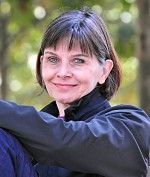Column Name
Title
Nancy Allen was born on Long Island and grew up in Garden City and Carmel, N.Y. A Juilliard alumna and a faculty member since 1985, she became the principal harpist of the New York Philharmonic in 1999. Formerly on the faculties of the Yale School of Music, Manhattan School of Music, and University of Michigan, Ann Arbor, Allen has been on the harp faculty at the Aspen Music Festival since 1978.
Body
When did you first know you wanted to be a musician and how did you come to know it?
I always loved music, playing the piano and oboe along with the harp from an early age. My oboe teacher used to keep my foot on top of his while he tapped out rhythms, and I tried to learn how to make reeds, but it seemed like too much! When it came time for my piano lesson, my mother, a piano teacher, always took a coffee break, so I sat alone at the keyboard and learned to sight read. She drove me past the old Juilliard School in the ’60s. It looked dark, serious, and important. I thought, “That’s where I am going.”
Who was the teacher or mentor who most inspired you when you were growing up?
I drew my first musical inspiration from my parents. My mother, a piano student at Columbia Teachers College in the 1940s, taught me to read music, and I did my homework while listening to her repeat phrases of Chopin. Once I wrote a school essay about how Chopin helped me learn mathematics. My father was a famous medical photographer who took his field by storm at the dawn of plastic and reconstructive surgery. At heart, he was a drummer. As I watched him develop photo after photo, he would say “Thank God you are a musician.” Both of them inspired me with their love of music.
What was the first recording that you remember hearing?
My father blasted Sousa marches throughout the house early in the morning. This was the first recorded music I heard. I guess it gave me good rhythm early on, and a love of marches, especially in Mahler symphonies. I heard an album of the French harpist Marcel Grandjany (my teacher) playing transcriptions when I was about 12. I fell absolutely in love with his intimate style and beautiful sound.
What’s the most embarrassing moment you’ve had as a performer or in your career?
I was performing the opening recital of the World Harp Congress in Chicago in the late 1980s. I was backstage ready to go. I always dress at the last possible minute because tuning my harp is more important. As I put my dress on, the zipper on the entire side of the dress broke open. I had only dental floss and a needle in my bag. It wasn’t the plain kind—it was waxed red cinnamon floss. I sutured the entire dress together quickly. I had to be cut out of it afterwards. People do not know what goes on backstage in this glamorous life!
If you could have your students visit any place in the world, where would it be, and why?
I would love for my students to visit the home of harpist/collector Rudiger Oppermann in France, near the German border. He has a collection of harps from all over the world, and I mean harps ranging from 3 to 47 strings. It is overwhelming to see.
What are some of your other interests or hobbies?
I love to play the piano and I love to ride horses. On my 50th birthday I bought myself a Steinway and then went riding on an Icelandic horse through the Vermont National Forest. I also love to drive and often drive with no apparent destination. I explore places and like to know exactly how to get from one place to another in my head. I think today’s “navigators” are silly. No one knows where anything is, people follow a voice. I have a map in my head at all times.
What would you like your students to remember from your teaching?
I would like my students to remember two things: 1—details, details; 2—big picture. The harp has 47 strings strung closely together. We have to weave into our music-making the ability to not buzz, and also to connect the sound from string to string. We also have to stop the sound with our hands. This “muffling” is an art. The purity of the process is what amazes and grips me, and you have to be very patient with the process. I also hope my students remember how important it is to respect their colleagues and learn from them.
What is your favorite thing about New York City?
The energy of the city. My next favorite thing is when a huge snowstorm blankets the city and renders it a pedestrian’s paradise.
Is there anything you’d like to add?
I am immensely proud to be a faculty member at Juilliard. It’s always been a large part of my life. My students amaze me, and they hold positions and perform and teach all over the world. Come by and visit the harp room; it’s been the same room—311—for 40 years!





